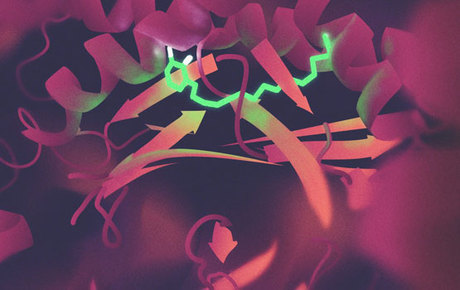Stop scratching!

A new study by an international consortium of scientists, including Monash University’s Professor Jamie Rossjohn, may have pinpointed the mechanism through which relief from psoriasis and contact dermatitis may be afforded to millions of sufferers worldwide.
Psoriasis afflicts 2–3% of the global population, ranging from occasional itching or seasonal scratchiness to a disfiguring condition that leaves patients in both physical pain and mental anguish from the incessant itchiness. There is no known cure, and management therapies such as restrictive diets, overpriced unguents and foul-smelling, coal-tar solutions offer at best temporary relief. Contact dermatitis is meanwhile caused by exposure to small organic or inorganic molecules such as the sap compound urushiol, which is present in poison ivy, poison oak and other plants in the genus Toxicodendron.
Research into these common skin diseases has been hindered by the fact that laboratory mice do not naturally have the gene responsible for these skin conditions in humans. Thus, the first step was genetically engineering the mice to express CD1a.
CD1a is a lipid-presenting molecule that only lives on one type of immune cell (Langerhans cells) but acts as a messenger for other immune cells and, critically, is the key ingredient in understanding the process of skin inflammation. Langerhans cells constitute the principal dendritic cell subset in human epidermis and express CD1a abundantly. They are also critical in understanding the intricate immune system of the skin, especially with regards to immune responses to extrinsic insults such as allergens and autoimmune diseases like psoriasis.
The skin inflammation caused by exposure to urushiol is similar to the autoimmune response found in psoriasis sufferers. The researchers found that CD1a-blocking antibodies alleviated poison ivy-induced skin inflammation in the genetically engineered mice. To determine if these results are relevant to humans, blood samples from human subjects who had experienced poison ivy rash in the past six months were tested. The results indicate that CD1a-blocking antibodies have great potential as a therapeutic target in treating both contact skin inflammation and inherited skin diseases.
This study has been published in the journal Nature Immunology. It was funded by the National Research Foundation of Korea, the US National Institutes of Health, the AMOREPACIFIC Research Scholar Program, the National Health and Medical Research Council and the Australian Research Council.
Melatonin helps to prevent obesity, studies suggest
In an experiment carried out in rats, chronic administration of melatonin prevented obesity to a...
Personality influences the expression of our genes
An international research team has used artificial intelligence to show that our personalities...
Pig hearts kept alive outside the body for 24 hours
A major hurdle for human heart transplantation is the limited storage time of the donor heart...







